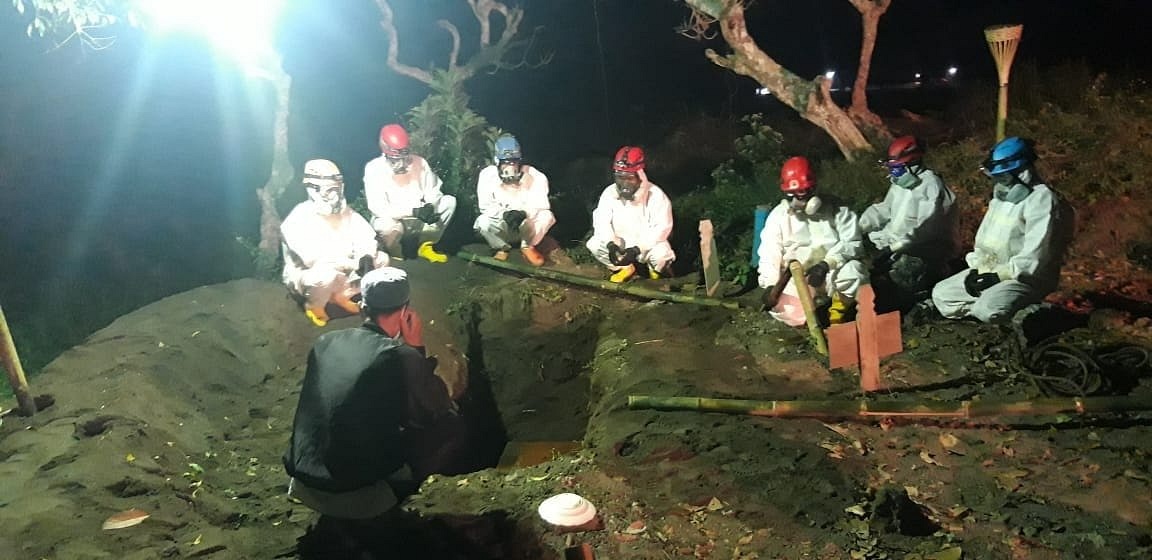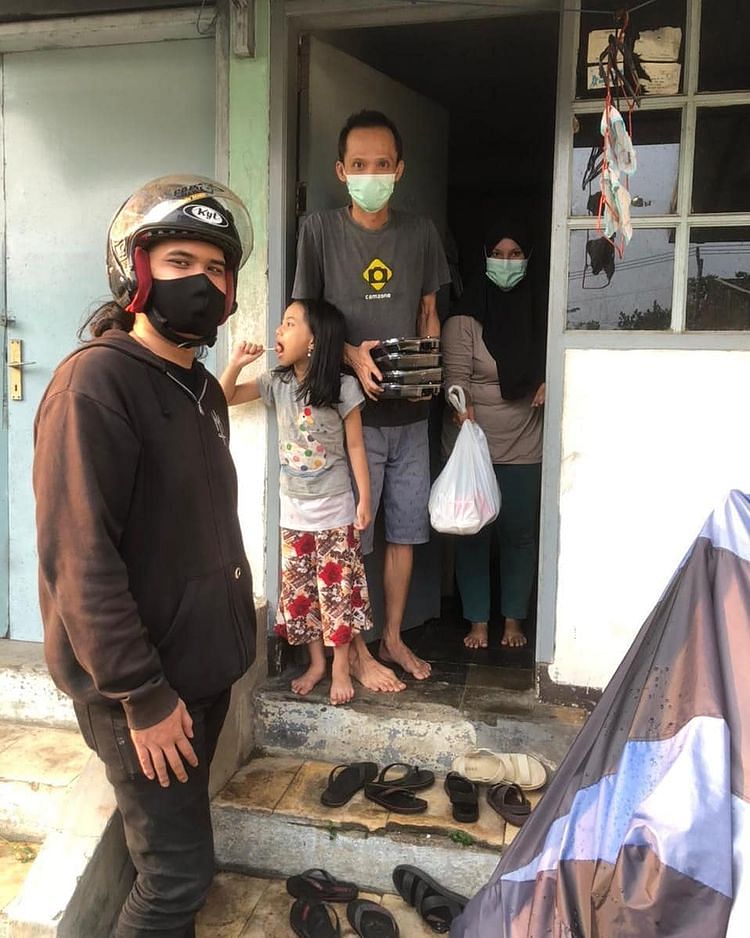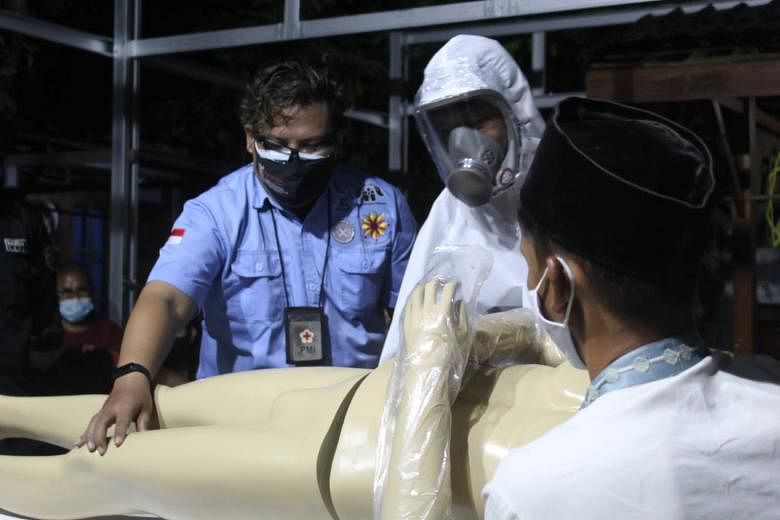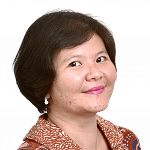JAKARTA - Indonesian volunteer undertaker Raden Mas Yohanes Samiaji says a prayer silently every time he cleans up the body of someone who had died of Covid-19 at home, in preparation for burial.
He covers the eyes, nostrils and ears of the dead person with alcohol-soaked cotton and seals their mouth with plasters as a safety precaution. Battling his own fears, he tries to finish the job calmly.
"I am afraid of getting infected and it's so human. But my intention is just to help, so I just do it," he told The Straits Times. "Every human is born, gets sick, ages and dies. It is death that makes one's life perfect."
The 46-year-old tour agency driver also volunteered during the 2004 tsunami in Aceh, and participated in a humanitarian mission with the International Committee of the Red Cross to Senegal in 2013 during the Ebola outbreak.
The tragedy of the Covid-19 pandemic, however, has hit home for the father of two. It has taken the lives of his own friends and relatives, as well as the lives of the total strangers he now helps.
His most heart-breaking case was taking care of the body of an old man who had lived alone and died unbeknown to his family and neighbours.
"His neighbours didn't know he was sick because he went about his daily activities as usual. But then he disappeared for a few days, and later they smelled something bad," Mr Samiaji said.
As the Covid-19 ravaged his hometown, Yogyakarta, and deaths soared in July, Mr Samiaji started to receive calls round the clock.
He handled up to 10 bodies a day then, even helping to carry coffins and dig graves, aggravating the pinched nerves in his lower back.
"Even if I get sick or die because of the Covid-19, I can accept it sincerely. That means I lose to natural selection," he said.
Volunteers like Mr Samiaji have worked tirelessly since the pandemic hit Indonesia in March last year, closing the gap where the government response has been slow or lacking.
Individually or collectively, they do various jobs, from collecting data to providing food and oxygen to the sick.


Learning about the Covid-19 in other parts of the world, 10 Indonesians decided to launch a crowdsourcing database platform KawalCOVID19.id in early March last year.
Now driven by up to 70 volunteers with diverse professional backgrounds, from doctors to IT experts, the group collects and compares official data from the national and regional governments, which it summarises and visualises with interactive graphs and maps.
Its co-founder Elina Ciptadi believes more accurate data will be key to understanding "the true magnitude of the pandemic".
"Basically, what we want to achieve is data transparency for better and well-targeted policies. We have to put our limited resources on things that will make the most impact," said Ms Elina, who is based in Singapore.
"The policies to tackle the pandemic will only be as good as the data we can see."
The government's response to the pandemic has been criticised as inadequate. Ms Elina said this is because the data does not reflect the actual number of cases, due to Indonesia's limited testing and tracing capacity.
Indonesia, now the epicentre of the outbreak in Asia, reported 3.8 million infections and 116,366 deaths as at Saturday (Aug 14). But, health experts say the real figures are likely much higher.
Last April, West Java farmer Niki Suryaman and his friends, musician Mochammad Dikky Zulkarnaen and shoe laundry owner Dani Chrisdian, heard that some 300 families, impacted by job losses and movement restrictions, had only cassava leaves to eat.
After collecting donations, they set up three communal kitchens in the provincial capital of Bandung.
One was located in a music studio. Some musicians, whose work had dried up with Covid-19 movement restrictions, turned to cooking.
The next month, the group distributed rice boxes to around 100 people as well as snacks for breaking fast.
"From the beginning, we've seen this as a situation that needs our collective response. As usual, the government is always late and responds slowly, whereas the basic needs like eating cannot wait," said Mr Niki, the co-founder of Solidaritas Sosial Bandung (SSB), or the Bandung Social Solidarity movement.
"We don't bother if there's social aid (from the government). As long as we can, we just help," he added.

By December last year, the SSB network was running 16 kitchens in and around Bandung, then largely driven by communities.
Besides garnering public donations, it also sells merchandise such as T-shirts and tote bags made and distributed by its volunteers, who range from designers to motorcycle taxi drivers.
As emergency restrictions were imposed early July amid surging Covid-19 cases in the city, the network has also offered staple food to some 500 self-isolating Covid-19 patients and aid packages to more than 1,000 residents in need, including laid-off labourers and families with babies.
In East Java, Ms Bety Sunarisasi has given care packages to the sick since last year.
Her own family tested positive for the disease in June. She and her son survived, but her husband did not.
While self-isolating in grief, the 49-year-old felt encouraged as friends and neighbours sent her food, supplements and even oxygen. This experience has made her want to spread kindness more, she said.
As soon after she recovered, the civil servant began sending oxygen, supplements, and meals to friends and relatives in self-isolation.
"When I got sick God took care of me. People who gave me aid were not the ones whom I helped," Ms Bety said.












